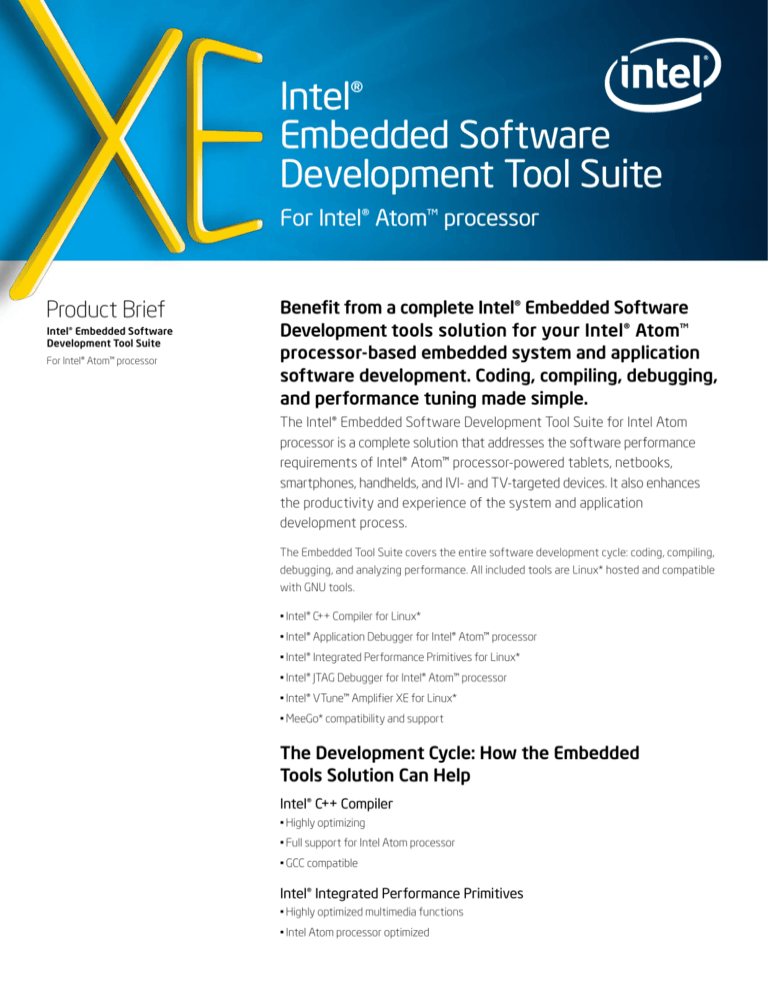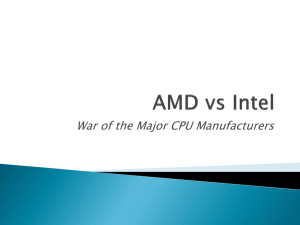
Intel®
Embedded Software
Development Tool Suite
For Intel® Atom™ processor
Product Brief
Intel® Embedded Software
Development Tool Suite
For Intel® Atom™ processor
Benefit from a complete Intel® Embedded Software
Development tools solution for your Intel® Atom™
processor-based embedded system and application
software development. Coding, compiling, debugging,
and performance tuning made simple.
The Intel® Embedded Software Development Tool Suite for Intel Atom
processor is a complete solution that addresses the software performance
requirements of Intel® Atom™ processor-powered tablets, netbooks,
smartphones, handhelds, and IVI- and TV-targeted devices. It also enhances
the productivity and experience of the system and application
development process.
The Embedded Tool Suite covers the entire software development cycle: coding, compiling,
debugging, and analyzing performance. All included tools are Linux* hosted and compatible
with GNU tools.
•Intel® C++ Compiler for Linux*
•Intel® Application Debugger for Intel® Atom™ processor
•Intel® Integrated Performance Primitives for Linux*
•Intel® JTAG Debugger for Intel® Atom™ processor
•Intel® VTune™ Amplifier XE for Linux*
•MeeGo* compatibility and support
The Development Cycle: How the Embedded
Tools Solution Can Help
Intel® C++ Compiler
•Highly optimizing
•Full support for Intel Atom processor
•GCC compatible
Intel® Integrated Performance Primitives
•Highly optimized multimedia functions
•Intel Atom processor optimized
Intel® JTAG and Application Debuggers
website enhance the value of the Intel IPP functions by illustrating
•Intel Atom processor and chipset support
the implementation of multithreaded application blocks such as video,
•Kernel and low-level driver debugging
•Application debugging
•Thread grouping and thread-specific run control
•Qt* C++ class awareness
•Linux* OS awareness
•Built-in flash memory tool
•Execution trace support
Intel® VTune™ Amplifier XE for Linux*
audio, and speech codecs.
Efficiency and Productivity
Debuggers
Intel® Debuggers for Intel Atom processor support all aspects of
debugging, from low-level driver and kernel debugging to highlevel language C++ application debugging, with full execution trace
support and flash memory writer capabilities (only with JTAG hardware
interface). Applications can be debugged on the host development
environment as well as remotely via TCP/IP.
•Tune code actually running on device
•Performance bottleneck identification
•Tuning assistant
•Event-based sampling targeted at embedded devices
MeeGo* Compatibility
•Validated for MeeGo*-based target devices
•Remote debug support for QEMU* MeeGo* image
•Support for Image Creator and chroot build environment
JTAG Debugger
The Intel® JTAG Debugger for Intel Atom processor is the
recommended debug solution for hardware manufacturers, embedded
developers, and operating system vendors who need to deal with
kernel debugging and low-level driver development. A JTAG debug
solution does not require a running operating system on the device.
So, it is ideal for bootcode and firmware debugging as well as kernel
debugging while booting the OS. Through a JTAG interface the
target hardware is connected to the debugger on the host system.
The JTAG debugger allows in-depth access of IA-specific features
Features
(e.g., execution trace support), as well as access to system-on-chip
Completeness
makes it valuable for driver development and debugging. The entire
Use a set of software tools based on the latest technology for
processor and peripheral registers are fully documented in the JTAG
the entire software product development cycle (design, generate,
debugger solution.
debug, and analyze) without the need to research the components
of other tools.
and chipset peripheral register content. This feature is unique and
Supported JTAG devices:
•Third-party vendor JTAG interface support available at Macraigor*.
Performance
The new, highly optimized in-order scheduler and improvements in the
Get the hardware device through www.macraigor.com/intel.
•Intel® XDP3 JTAG interface (enabling product only, no public
compiler provide a significant performance advantage over GCC. Highly
product—please contact Intel if you are a hardware manufacturer:
optimized Intel® Integrated Performance Primitives (Intel® IPP) provides
MIDDevTools@intel.com).
the same simple API as for Intel® Architecture (IA)-32 architectures,
while highly optimized for Intel Atom processors. Intel VTune Amplifier
Intel® Application Debugger
XE helps identify performance bottlenecks and analyze performance
The Intel® Application Debugger for Intel Atom processor supports all
data collected on the Intel® Atom™ processor-based target device.
aspects of debugging, from low-level assembler debugging to highlevel language C++ application debugging, with full execution trace
Multimedia and Performance Libraries
With Intel IPP, application developers can concentrate on feature
implementation rather than optimization of application code. Intel
IPP provides performance-optimized, building-block functions for key
software applications such as: multimedia playback/recording, editing,
image processing, audio/speech/signal processing, and network data
communications. Free code samples downloadable from the Intel®
support, which helps identify errors that are normally hard to detect.
On the development host, the application debugger supports TCP/
IP-based development and testing of MeeGo* applications within
a QEMU*-based virtual machine environment, as well as in an a
chroot wrapper. Thus, the debugger can be used not only to debug
applications that are running on actual Intel Atom processor-powered
devices, but also for host development system-based debug before
deployment to the targeted device. For threaded development, it
provides the ability to define thread groups and apply breakpoints and
run-control to specific application threads. Native testing and remote
debugging of processes running on a virtual machine reduce time
and simplify the development process. The full GUI-driven application
debugger supports execution trace unwinding to look back to the
history of an executed program, providing OS awareness and threadaware debugging.
System Requirements
Host System:
•Ubuntu* 10.04
•Fedora* 12 and Fedora 13
Target System:
•Support of most Intel® Atom™ processor variants (Zxxx, Nxxx, Dxxx,
and Exxx series)
MeeGo* SDK and Intel® Tools
•Intel® Media processor CE 3100
The Intel® Embedded Tool Suite is a set of highly optimizing software
•Intel® Atom™ processor CE 4100, and CE 4200
development tools, with powerful debuggers for more efficient debug
•Linux kernel 2.6.x*, MeeGo* 1.1 compliant OS
cycles. The tools are compatible with the GNU world and complement
the standard open source GNU tools offering, which are part of the
Intel® JTAG Debugger supports:
MeeGo* development environment.
•Intel® Atom™ processor Z5xx (SCH US15W), Z6xx, E6xx,
Furthermore, the tool suite integrates into the MeeGo* Image Creator
(MIC). Kickstart scripts tightly integrate the Intel C++ Compiler and
Intel IPP into MIC’s jailroot environment. This allows for save and host
environment pollution-free development, while taking advantage
of the full performance of your development system at build time.
CE 3100, CE 4100, and CE4200
•Intel® Media processor CE 3100
•Linux kernel 2.6.x*, MeeGo* 1.1 compliant OS
Alternatively, you can also install Intel C++ Compiler and Intel IPP into
Support
a MeeGo* virtual image running under QEMU* or a physical device
Every purchase of an Intel® Embedded Software Development
running MeeGo*. Simply download a developer MeeGo* image and
Product includes one year of support services, including access to
install the Intel® C++ Compiler, Intel IPP, or the debug server from the
Intel® Premier Support and all product updates during that time.
Intel® Embedded Software Development Tool Suite directly into it to
Intel Premier Support gives you online access to technical notes,
start even faster with the development of MeeGo*-based system and
application notes, and documentation.
application software.
Additional help can be found at:
Intel® VTune™ Amplifier XE for Linux*
Intel VTune Amplifier XE makes it fast and easy to find performance
bottlenecks with a list of the most active functions. Click on a
function name to display the source and show the most timeconsuming source statements. Furthermore, event-based sampling
support for low-power Intel Atom processors permits you to
determine the causes for execution stalls that impact performance.
The Sampling Collector for Intel® VTune™ Amplifier XE driver for eventbased sampling can be rebuilt within the target OS build environment
on the host, accommodating limits in the software stack on some
target devices. A modifiable build configuration script is provided for
this purpose.
https://registrationcenter.intel.com/support/
User forum:
http://software.intel.com/en-us/forums/software-developmenttoolsuite-atom/
Download a trial version today
Intel® Embedded Software Development Tool
Suite for Intel® Atom™ processor:
www.intel.com/software/products/atomtools
Optimization Notice
Intel compilers, associated libraries and associated development tools may include or utilize options that optimize
for instruction sets that are available in both Intel and non-Intel microprocessors (for example SIMD instruction
sets), but do not optimize equally for non-Intel microprocessors. In addition, certain compiler options for Intel
compilers, including some that are not specific to Intel micro-architecture, are reserved for Intel microprocessors.
For a detailed description of Intel compiler options, including the instruction sets and specific microprocessors they
implicate, please refer to the “Intel Compiler User and Reference Guides” under “Compiler Options.” Many library
routines that are part of Intel compiler products are more highly optimized for Intel microprocessors than for other
microprocessors. While the compilers and libraries in Intel compiler products offer optimizations for both Intel and
Intel-compatible microprocessors, depending on the options you select, your code and other factors, you likely will
get extra performance on Intel microprocessors.
Intel compilers, associated libraries and associated development tools may or may not optimize to the same degree
for non-Intel microprocessors for optimizations that are not unique to Intel microprocessors. These optimizations
include Intel® Streaming SIMD Extensions 2 (Intel® SSE2), Intel® Streaming SIMD Extensions 3 (Intel® SSE3),
and Supplemental Streaming SIMD Extensions 3 (SSSE3) instruction sets and other optimizations. Intel does not
guarantee the availability, functionality, or effectiveness of any optimization on microprocessors not manufactured by
Intel. Microprocessor-dependent optimizations in this product are intended for use with Intel microprocessors.
While Intel believes our compilers and libraries are excellent choices to assist in obtaining the best performance on
Intel and non-Intel microprocessors, Intel recommends that you evaluate other compilers and libraries to determine
which best meet your requirements. We hope to win your business by striving to offer the best performance of any
compiler or library; please let us know if you find we do not.
Notice revision #20110307
© 2011, Intel Corporation. All rights reserved. Intel, the Intel logo, Intel Atom, and Intel VTune are trademarks of Intel Corporation in the U.S. and other countries.
*Other names and brands may be claimed as the property of others.
0311/BLA/CMD/PDF
EDT999LSAE01-002US








